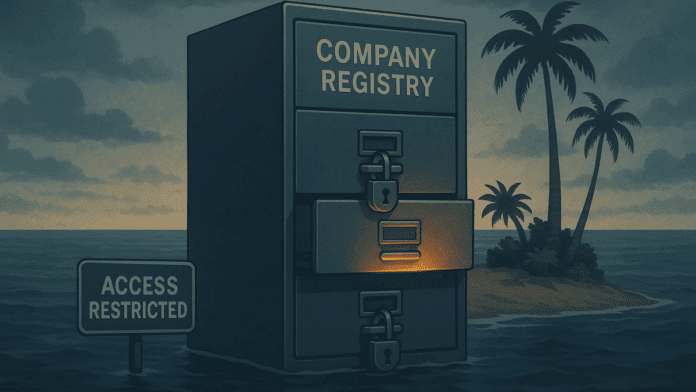The British Virgin Islands (BVI) has introduced new rules for accessing its company ownership register. This register holds vital information about who owns companies based in the islands. However, the new rules are now facing heavy criticism from anti-corruption groups.
These critics say the BVI’s plan makes it easier for criminals to hide their money and harder for investigators to do their jobs. While some changes have been made, they are seen as too small to fix the real issues. The BVI’s company register is one of the largest in the UK’s Overseas Territories, with nearly ten companies for every resident on the islands.
The most worrying part of the new rules is that people who own companies will now be alerted whenever someone tries to look up their ownership details. This means that journalists, non-profits, or investigators who want to check on shady business dealings may end up being identified by the very people they are trying to investigate. This can lead to fear of retaliation, harassment, or even legal threats.
Experts say this defeats the purpose of having a transparent company register. Instead of helping fight corruption and crime, the new system might end up protecting it.
BVI Policy Changes Seen as Obstacle to Transparency
The main concern is how the BVI defines “legitimate interest”. This term describes the kind of person or group allowed to access company ownership information. The new rules have slightly improved this by making it easier for people to qualify. For example, users no longer need to already be part of a criminal investigation to request data. They just need to show that they are working to detect or prevent financial crime.
However, that’s where the improvements stop. The changes also add new ways for company owners to block their information from being shared. Owners can now claim that releasing their data might harm public safety or national security — not just in the BVI but anywhere in the world. They can also say it’s simply not in the “public interest” to release the data. These phrases are vague and easy to misuse.
To back up their objections, owners are allowed to submit documents like police reports, legal notices, or even letters from national security agencies. In some cases, they can even apply for full exemption from having their data shared at all. Anti-corruption campaigners argue that this creates a maze of red tape. It makes the process slow and difficult for those trying to uncover wrongdoings.
In simple terms, people trying to investigate illegal money flows may find the door slammed in their face — while those hiding dirty money can rest easy.
Global Concerns Over Money Laundering
The issue comes at a time when international bodies are already worried about the BVI’s efforts to fight financial crime. Recently, a major global watchdog placed the BVI on a “grey list”. This means the island is under special monitoring for not doing enough to stop money laundering and other shady activities.
The BVI, along with other British Overseas Territories, had promised to create more transparent systems for accessing company ownership information. But campaigners say the new rules fall far short of this promise. In fact, the rules may make things worse.
Studies from the past have already shown that companies based in the BVI have been linked to hundreds of serious corruption and money laundering cases. Some of this money has even been used to buy property in the UK, causing billions of pounds in economic damage. Yet, very little of the money actually stays in the BVI. It mostly moves through the island’s secretive financial system and disappears into other countries.
Campaigners argue that without real access to ownership data, it becomes almost impossible to stop this flow of dirty money. The current system seems to protect the people who want to stay hidden rather than help those trying to bring truth to light.
